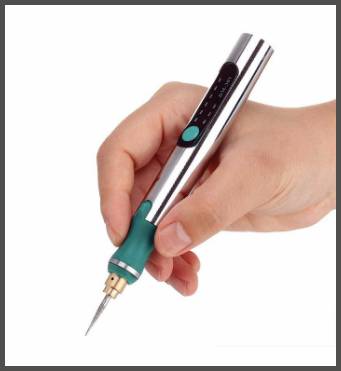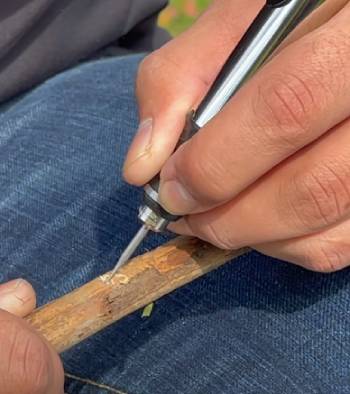If you’re into crafts, DIY projects, or even personalizing gifts, the idea of owning an engraving pen probably sounds pretty exciting. Who wouldn’t want to take a plain old object and turn it into something personalized and special?
The Artisan Engraving Pen promises to do just that, allowing you to engrave on everything from wood to metal and even gemstones. But before you rush out to buy this tool, let me share my personal experience using it and why, ultimately, it might not be the best choice for you.
My Experience With Artisan Engraving Pen

Using the Artisan Engraving Pen was a bit of a mixed experience for me.
Initially, I was excited to try it out, especially since it claimed to work on a variety of materials like wood, glass, and even metal.
Setting it up was simple enough, as it only required attaching the engraving bit like you would with any other drill tool.
However, as soon as I began engraving, some of the tool’s flaws became apparent.
The first issue I encountered was with precision. I wanted to create some detailed designs on wood, but the pen struggled to maintain smooth, clean lines. It felt like it lacked the necessary control, and I found myself constantly adjusting my hand to keep it steady. When I tried to engrave on metal, the pen worked better but still wasn’t as precise as I had hoped.
After about 15 minutes, the vibration from the pen became uncomfortable. It’s also surprisingly loud for such a small tool, which took away from the overall experience. While it did manage to engrave on different materials, the inconsistency in performance made it frustrating to use for more detailed work.
Ultimately, while the Artisan Engraving Pen is functional, it lacks the finesse and reliability needed for more serious projects. I wouldn’t recommend it if you’re looking for a high-precision, comfortable tool for intricate engraving.
Pros of The Artisan Engraving Pen
Let’s talk about the positive aspects. To be fair, the Artisan Engraving Pen does have some things going for it.

- Wide Compatibility: The universal shank is a big plus. It fits most standard drilling tools, so if you already have a drill at home, you won’t need to buy a separate device to use this engraving pen. The fact that the bits come in multiple sizes also adds to its flexibility.
- Durable Bits: The carving bits themselves are fairly durable. They hold up well, even when you’re using them on harder materials like metal or wood. This tool can handle some heavy-duty use, which is good if you plan on using it often.
- Versatility: The ability to engrave on everything from wood to gemstones is a major selling point. If you’re someone who likes to experiment with different materials, this could be a tool worth trying just for the variety it offers.
- Simple Setup: Installing the engraving bits is straightforward. Just like you would attach any drill bit, the Artisan Engraving Pen requires no special tools or complicated steps to get started. It’s pretty user-friendly in that sense.
Cons of The Artisan Engraving Pen
Unfortunately, despite its potential, the Artisan Engraving Pen has its fair share of downsides. And while the pros might seem attractive at first glance, the cons are significant enough to make me hesitant about recommending this tool.
- Inconsistent Performance: One of the biggest issues I faced with the Artisan Engraving Pen is its inconsistent performance. While the bits are durable, they don’t always work as smoothly as advertised. For instance, when working on softer materials like wood, the pen tends to jump or skip, making it hard to maintain control over your engraving. This inconsistency makes the tool difficult to use, especially for beginners.
- Poor Handling on Delicate Materials: While the Artisan Pen claims to work well on delicate materials like jewelry or gemstones, I found that it struggled significantly in this area. When trying to engrave on softer or more fragile surfaces, the pen often left uneven marks or even caused damage. This makes it hard to trust for projects that require precision, which is a major letdown.
- Lack of Precision: Engraving requires a certain level of finesse and precision, especially if you’re working on smaller, detailed projects. Unfortunately, the Artisan Engraving Pen doesn’t offer the level of control needed for intricate designs. Even with practice, I found it difficult to achieve clean, precise lines.
- Loud and Uncomfortable: Another major downside is how loud and uncomfortable the pen is to use. The motor is surprisingly noisy for such a small tool, and after a few minutes of use, the vibration makes it uncomfortable to hold. This makes longer projects almost unbearable to complete in one sitting.
Maintenance Tips For Artisan Engraving Pen
If you’ve already purchased the Artisan Engraving Pen and are determined to make the most of it, here are a few maintenance tips to keep it working as well as possible:
- Regularly Clean the Bits: Engraving creates dust and debris, especially when working on materials like wood or glass. Make sure to clean the bits after each use to prevent buildup.
- Sharpen the Bits: Over time, the bits may lose their sharpness, especially if you’re using the pen frequently. Sharpening the bits periodically can help improve performance, although this may not fully resolve the inconsistency issues.
- Avoid Overheating: Since the pen tends to get warm during extended use, try to limit how long you use it at one time. Give it breaks to cool down between projects to avoid damaging the motor.
- Use the Right Bit for the Material: Be mindful of which bit you’re using for different materials. Using the wrong bit can result in poor performance and even damage your project.
Comparing The Artisan Engraving Pen To Other Brands
When looking at engraving tools, the Artisan Engraving Pen isn’t the only option out there. In fact, there are several other brands that offer more reliable, user-friendly engraving tools. Let’s compare the Artisan Engraving Pen to a few other popular options:
- Culiau Engraving Pen

The Culiau Engraving Pen is often hailed as a more reliable and precise alternative to the Artisan Engraving Pen.
One standout feature of the Culiau is its ergonomic design, making it far more comfortable to use, even for extended periods.
This is in stark contrast to the Artisan pen, which can become uncomfortable due to its vibrations and bulkier design.
Culiau’s engraving bits are also highly durable, and the pen performs consistently across a variety of materials. Whether you’re working with metal, glass, or wood, the Culiau Engraving Pen offers a much smoother experience.
Additionally, its built-in LED light is a small but helpful feature, allowing you to better see the area you’re engraving—especially when working on intricate designs.
Where the Artisan Engraving Pen falters in terms of precision, the Culiau shines. If you’re looking for something that offers better control and comfort, Culiau might be the better option.
- General Tools Electric Engraver
The General Tools Electric Engraver is another strong competitor. Known for its powerful motor, the General Tools model is ideal for heavier-duty engraving projects. It’s capable of handling materials like steel and glass with ease, and unlike the Artisan pen, it delivers consistent results on harder surfaces.
One of the key benefits of the General Tools engraver is its adjustable stroke settings. You can control the depth of the engraving, making it versatile for different types of projects.
This feature is notably absent in the Artisan Engraving Pen, limiting the kinds of engraving tasks it can tackle effectively.
On the downside, the General Tools Electric Engraver is slightly bulkier and may not be as well-suited for intricate designs as the Culiau or other more nimble options. However, if you’re primarily working with tougher materials, its power and durability give it an edge over the Artisan Engraving Pen.
- Utool Engraving Pen
The Utool Engraving Pen offers a good balance between precision and power. Much like the Culiau, the Utool is ergonomically designed for comfort and ease of use. It’s quieter than the Artisan Engraving Pen, which is a huge plus for longer engraving sessions.
What sets Utool apart is its versatility in handling both delicate and tough materials. The Artisan pen struggles with precision, especially on softer materials, but the Utool Engraving Pen manages to deliver fine, detailed engravings on surfaces like jewelry, glass, and even gemstones.
It’s a versatile tool that offers more control than the Artisan Engraving Pen, making it suitable for both beginners and experienced users.
- Dremel Engraver
Finally, the Dremel Engraver is perhaps the gold standard in engraving tools. While it’s on the higher end of the price spectrum, the Dremel provides unmatched precision and control. Its ergonomic grip and vibration control make it comfortable to use, even for complex projects that require fine details.
The Dremel Engraver also has variable speed settings, which allow you to adjust the tool’s performance based on the material you’re working with. This flexibility makes it far superior to the Artisan Engraving Pen, which tends to underperform on harder surfaces and lacks the finesse needed for more intricate designs.
If you’re serious about engraving, the Dremel Engraver is worth the investment. While it may cost more upfront, its consistent performance and durability make it a far better option than the Artisan Engraving Pen for both casual users and professionals alike.
Frequently Asked Questions (FAQ)
An engraving pen can be used to personalize and add designs to a variety of surfaces, such as wood, metal, glass, and even jewelry. You can use it to create custom gifts, label items, or add decorative touches to your projects.
You can engrave anything from initials to a special date or meaningful quote on a pen. Engraving a pen can make for a thoughtful and personalized gift, especially for milestones like graduations or anniversaries.
An electric engraver is a tool that uses a small motor to rotate a bit, allowing you to carve or etch designs into a variety of materials. It’s commonly used for craft projects, personalization, and even some industrial applications.
Final Thoughts
While the Artisan Engraving Pen may seem like an appealing choice for beginners, the downsides far outweigh the benefits.
Inconsistent performance, lack of precision, and general discomfort during use make this tool hard to recommend, especially when there are much better options available on the market.
If you’re serious about engraving, investing in a higher-quality tool will make all the difference in your projects.
